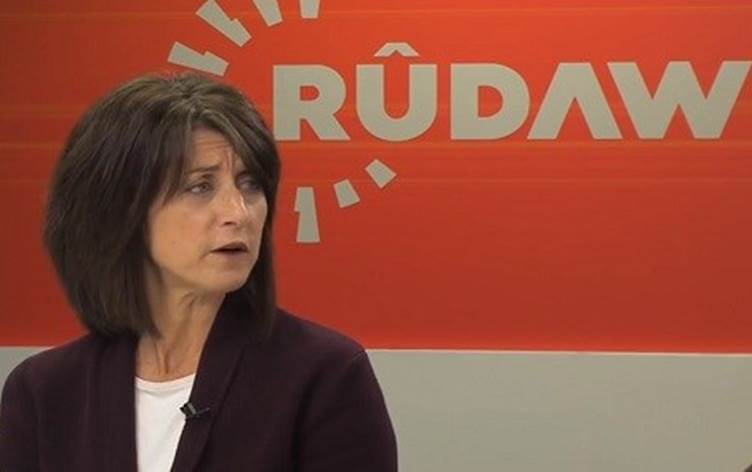US President Donald Trump has appointed Denise Natali as his new assistant secretary of state for conflict and stabilization. Natali is a widely recognized expert on Kurdish issues, but she is also a fierce critic of the Kurdistan Regional Government (KRG) and its relationship with Washington.
Natali is the director for strategic research at the Institute for National Strategic Studies (INSS), National Defense University, where she specializes on the Middle East, Iraq, trans-border Kurdish issues, and post-conflict stabilization, according to a short bio published by the White House.
Prior to joining INSS in January of 2011 as the Minerva Chair, Natali spent more than two decades researching and working in the Kurdish regions of Iraq, Turkey, Iran, and Syria, and was also engaged in post-conflict relief and stabilization.
From 2005 to 2010, Natali supported a university start-up and taught at public and private universities in the Kurdistan Region of Iraq, including the American University of Iraq Sulaimania (AUI-S). She speaks French and is conversant in Kurdish and Farsi.
Based on her résumé, Natali might be expected to be a vocal supporter of the US relationship with the KRG and a proponent of an independent Kurdish nation. However, Natali has written several articles and comment pieces critical of Kurdish elites, American patronage, and the aspiration of independence.
In an October 26, 2017 commentary for War on the Rocks, titled ‘Debunking Myths about Kurds, Iraq, and Iran,’ Natali said “Kurdish leaders have themselves to blame for their current predicament, not the United States,” and called for a “reset” in US-KRG relations.
“The Americans should continue to support the Kurdistan Regional Government as an integral part of the Iraqi state, according to the Iraqi constitution. Yet pleading with and coddling Kurdish officials is not a policy and does not advance US interests.
“If Washington seeks a stable partner in Erbil as part of Iraq, it should stop enabling bad behavior and place conditions on its support to the Kurdistan Regional Government, including institutional reform and termination of military and financial support,” she said.
In an October 31, 2017 column for Foreign Policy magazine, titled ‘Iraqi Kurdistan was never ready for Statehood,’ she is scathing about the weaknesses of the KRG.
“The KRG leadership has promoted a narrative about the region being a secular democracy with a booming economy and cohesive military force — but, in reality, the landlocked region has long been economically unstable, institutionally weak, and politically divided,” she said.
“Instead of admitting their strategic miscalculations, Barzani and other Kurdish leaders have denied responsibility for the referendum fiasco and its fallout. This group can be counted on to continue playing the victim card, blaming ‘traitors’ for their institutional deficiencies, and harping on outside threats, including Iran and its militias, rather than devoting attention to their internal problems and institutional reform,” she added.
Her criticism goes back even further. In an earlier piece for Foreign Policy magazine from April 4, 2012, titled ‘Coddling Iraqi Kurds,’ Natali warns that failing to rein in the KRG could cause Kurds in Turkey, Iran and Syria to launch similar efforts for independence, destabilizing the regional balance.
“By over-determining Kurdish leverage in Iraq and under-estimating the KRG’s dependence on external patronage, the United States has given the KRG leadership little incentive to moderate its behavior or compromise with Baghdad,” she wrote.
“As the KRG enhances its status in the Iraqi state, Kurdish communities in Turkey, Syria, and Iran will likely increase their demands for similar rights, creating new pressures for Kurdish autonomy across borders,” she added.
In a series of recommendations, she says “the Kurdish leadership should not contemplate separating the KRG from Iraq or pursuing independence.”
She warns US lawmakers that “stability in the Kurdistan region has come at the expense of increasing authoritarianism.”
“The KRG will ultimately have to recognize that it is no longer a victim in post-Saddam Iraq and that if it wants to reap the benefits of Iraqi federalism, then it too, will have to make compromises, create openings to the south, and play by the rules of the game. As long as the KRG has preferential US support as a crutch, it may have little interest in pursuing these larger objectives.”
While Natali’s call for internal reforms is a valuable and well-meaning contribution, her views on rolling back the Washington-Erbil relationship jar with those who recognize the value of maintaining a strong relationship with the Kurds.
Many in the US recognize the role Kurdish forces played in the ground war against ISIS with western air support, saving the US from having to deploy vast number of its own forces.
It is also unclear how she will influence the Trump administration’s approach to its Kurdish allies fighting ISIS in Syria, which are coming under growing pressure from Ankara and Damascus.
Meanwhile in Iran, Kurdish opposition parties may prove important allies as the US looks to squeeze Tehran.
Likewise, if the US hopes to stem Iranian influence in the new government currently taking shape in Baghdad, it may look to the Kurds to help tip the balance in Washington’s favor.




Comments
Rudaw moderates all comments submitted on our website. We welcome comments which are relevant to the article and encourage further discussion about the issues that matter to you. We also welcome constructive criticism about Rudaw.
To be approved for publication, however, your comments must meet our community guidelines.
We will not tolerate the following: profanity, threats, personal attacks, vulgarity, abuse (such as sexism, racism, homophobia or xenophobia), or commercial or personal promotion.
Comments that do not meet our guidelines will be rejected. Comments are not edited – they are either approved or rejected.
Post a comment